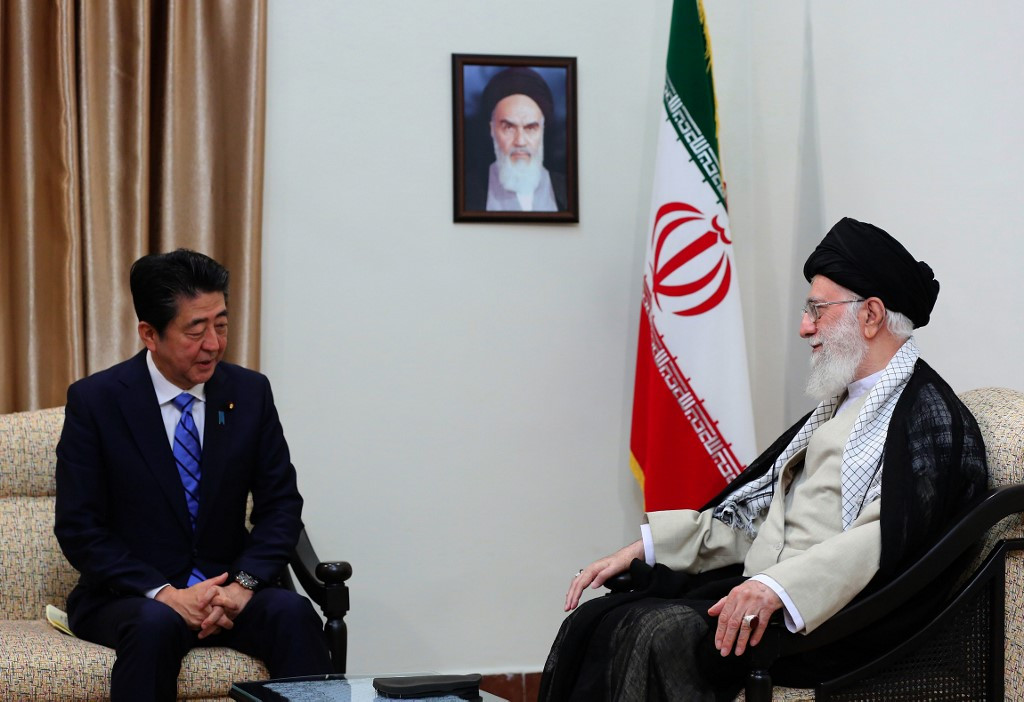Popular Reads
Top Results
Can't find what you're looking for?
View all search resultsPopular Reads
Top Results
Can't find what you're looking for?
View all search resultsAbe flexes diplomatic muscle as he seeks to mend Iran-US standoff
Abe hopes his close relationship with US President Donald Trump and Japan’s diplomatic ties crafted with nations in the Middle East will provide leverage that can be tapped to defuse regional tensions amid antagonism between Washington and Tehran.
Change text size
Gift Premium Articles
to Anyone
 A handout picture provided by the Iranian supreme leader office shows, Iranian Supreme Leader Ayatollah Ali Khamenei during a meeting with Japanese Prime Minister Shinzo Abe in Tehran on June 13, 2019. Abe met Khamenei seeking to ease tensions between Tehran and Washington during the first visit by a Japanese premier since the 1979 Islamic revolution. Tokyo is a key ally of Washington and has also traditionally enjoyed good ties with Tehran.
(AFP/HO / IRANIAN SUPREME LEADER'S WEBSITE)
A handout picture provided by the Iranian supreme leader office shows, Iranian Supreme Leader Ayatollah Ali Khamenei during a meeting with Japanese Prime Minister Shinzo Abe in Tehran on June 13, 2019. Abe met Khamenei seeking to ease tensions between Tehran and Washington during the first visit by a Japanese premier since the 1979 Islamic revolution. Tokyo is a key ally of Washington and has also traditionally enjoyed good ties with Tehran.
(AFP/HO / IRANIAN SUPREME LEADER'S WEBSITE)
T
he purpose of Prime Minister Shinzo Abe’s visit to Iran is twofold: to deliver a message aimed at easing US-Iran tensions, and also to ensure stability in Japan’s crude oil imports.
Abe hopes his close relationship with US President Donald Trump and Japan’s diplomatic ties crafted with nations in the Middle East will provide leverage that can be tapped to defuse regional tensions amid antagonism between Washington and Tehran.
At the start of his meeting with Iranian President Hassan Rouhani on Wednesday, Abe conveyed his expectations for the series of meetings scheduled for his visit. Abe said he had been invited to Iran many times and such a visit had “finally become a reality.” The prime minister also said he was happy to meet Rouhani in Iran.
Japan has independently maintained ties with Iran through channels including oil trade even after the 1979 Iranian Revolution, which triggered the rupture of official US-Iran relations. This latest meeting between Abe and Rouhani was their eighth.
In 1983, Abe accompanied his father, then Foreign Minister Shintaro Abe, on a visit to Iran during a period of heightened concern that the Strait of Hormuz would close because of the Iran-Iraq War. Abe was a personal secretary to his father at the time. During his meeting with Rouhani, Abe made a point of mentioning his long-standing connections with Iran and expressed gratitude for the “very warm” hospitality he received while accompanying his father on that trip.
Since Abe began his second stint as prime minister in December 2012, he has visited nations and territories in the Middle East — including Saudi Arabia and the United Arab Emirates — a total of 18 times and crafted relationships even with the leaders of nations hostile to Iran. Abe’s Iran trip was expected to generate a backlash from Saudi Arabia, Israel, the UAE and others, but the prime minister telephoned leaders of these nations to obtain their understanding for his visit.
Abe’s meeting with Ayatollah Ali Khamenei on Thursday was the first between the leader of a Western ally and Iran’s supreme leader since US President Donald Trump announced in May 2018 that the United States was withdrawing from a nuclear deal between Iran and several major world powers. Britain, France and Germany — three signatories to the nuclear agreement — have struggled to build good ties with the Trump administration, and their leaders’ weakening domestic political support has left them in no position to seek a breakthrough in the Iranian issue.
Embarking on a drive to find a solution to an apparently deadlocked international problem, Abe has also raised hopes for progress among the international community. “This marks a major change of era for Japanese diplomacy,” a senior Foreign Ministry official said.
The aim of Abe’s trip also is significant: securing stability in the Middle East, a region directly linked to Japan’s national interests. Japan depends on the Middle East for about 90 percent of its crude oil imports, and a little over 80 percent of these imports pass through the Strait of Hormuz. Iran has hinted at closing the strait while it spars with the United States. If such a closure materialized, it would deliver a stinging blow to Japan’s economy.
Abe is thought to have used his meeting with Rouhani to press the Iranian president to refrain from shutting this vital waterway. However, a close aide to Abe said before leaving for Iran that the trip could be considered a success if the prime minister were able to pave the way for easing tensions in the region.
“It’s hard to tell how Iran will approach these talks,” the aide said. “I don’t think this problem can be resolved with just one visit









